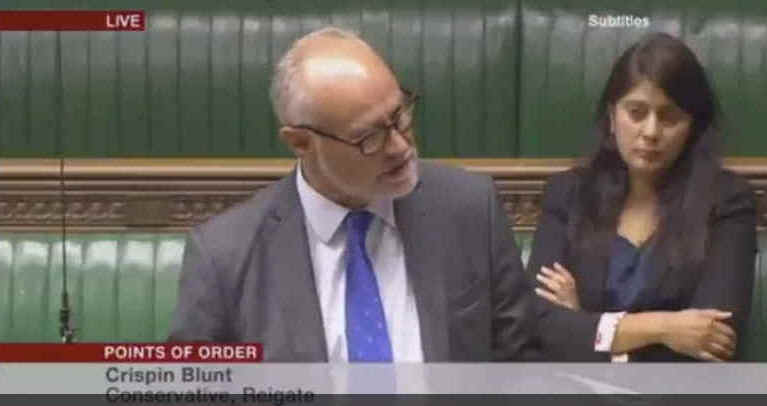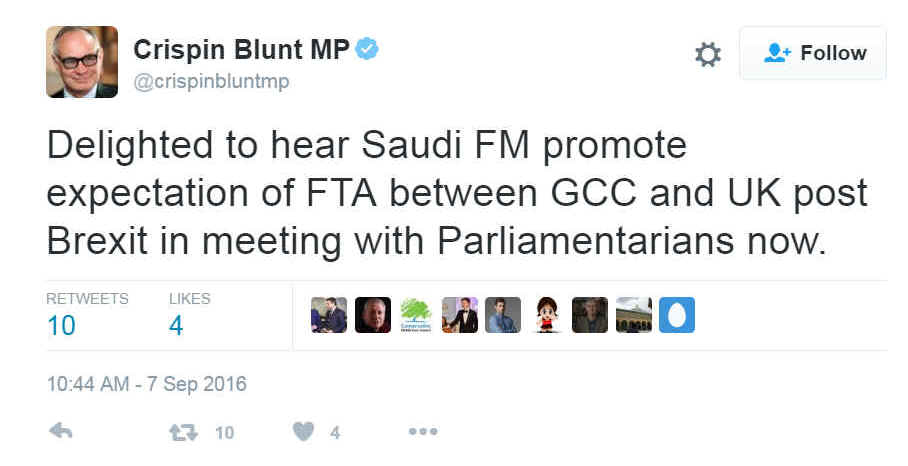
Strenuous efforts are under way to water-down a report by British MPs which – in its draft form – calls for a suspension of arms sales to Saudi Arabia.
The draft version, prepared by the all-party Committee on Arms Export Controls, was leaked to the BBC and quoted extensively on the Newsnight programme earlier this week. One of its key sentences said:
"The weight of evidence of violations of international humanitarian law by the Saudi-led coalition in Yemen is now so great that it is very difficult to continue to support Saudi Arabia while maintaining the credibility of our arms licensing regime."
Writing about this in a blog post on Wednesday, I commented: "The fact that a draft version of its report was leaked to the BBC means that any softening of text in the final version is now certain to be noticed."
That has now happened and a determined attempt to scupper the report is under way. The Guardian reports:
"The staunchly pro-defence Labour MP John Spellar, with support from some Conservative committee members including the chair of the foreign affairs select committee Crispin Blunt, has tabled more than 130 amendments to change the report, including removing the call for a suspension of arms sales."
The effect of these amendments is explained in the video clip below (from a subsequent edition of the Newsnight programme):
In a furious outburst in the House of Commons, Mr Blunt also denounced "a deliberate campaign" – by members of the public – to influence the committee and called for the hiring of private investigators "to interrogate the electronic records, including deleted emails" in order to establish who leaked the draft report.
Although Mr Blunt was horrified that British voters have been trying to influence the committee, he seems unconcerned by the fact that Saudi Arabia's foreign minister was in London this week doing exactly the same thing.
In parliament on Wednesday, prime minister Theresa May was questioned about the arms sales by opposition leader Jeremy Corbyn who said:
"I remain concerned that at the heart of this government’s security strategy is apparently increased arms exports to the very part of the world that most immediately threatens our security. The British government continue to sell arms to Saudi Arabia that are being used to commit crimes against humanity in Yemen, as has been clearly detailed by the UN and other independent agencies. Will the prime minister commit today to halting the sale of arms to Saudi Arabia that have been used to prosecute this war in Yemen, with the humanitarian devastation that has resulted from that?"
In response to Mr Corbyn's suggestion that the sale threaten Britain's security, Mrs May replied:
"Actually, what matters is the strength of our relationship with Saudi Arabia. When it comes to counter-terrorism and dealing with terrorism, it is that relationship that has helped to keep people on the streets of Britain safe."
If true, this is a shocking claim to make because it implies the government must continue being nice to one of the nastiest regimes in the Middle East – otherwise "the streets of Britain" will become less safe.
Whether it's actually true is another matter. Conveniently for the government, the hush-hush nature of counter-terrorism means it can say the Saudis are being very helpful without providing evidence in support. The only instance so far made public was the "laser printer bomb plot" in 2010, and in that case the tip-off reached Britain via the United States – not directly from Saudi Arabia.
While highlighting the supposed counter-terrrorism benefits of Britain's relationship with Saudi Arabia, Mrs May omitted to mention the more venal aspects which in reality are probably more important. British exports to the kingdom in 2014 were more than £4 billion and imports from the kingdom were £2 billion. A large proportion of the exports are arms sales: last year the British government approved licences for military exports to Saudi Arabia amounting to £2.8 billion.
Following the referendum in June, arms sales to Saudi Arabia have also become entwined in the Brexit debate. Those in government who favour leaving the EU and its single market are now desperately looking for ways to compensate for lost trade and one solution would be to push for more business with unsavoury regimes like that of Saudi Arabia.
The Saudis, of course, are well aware of this. In his effort this week to avert a suspension of arms sales Saudi foreign minister Adel al-Jubeir tempted MPs with the prospect of a post-Brexit free trade agreement between Britain and the Gulf Cooperation Council states. Jubeir appears to have said this in a private briefing but Mr Blunt leaked the information via Twitter – one leak that presumably he will not be wanting private detectives to investigate.


 RSS Feed
RSS Feed
